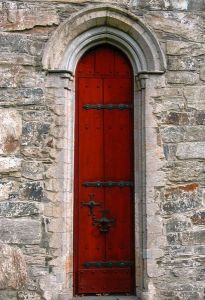He was seven years old when he learned he was deaf. Born deaf, to Deaf parents, he never knew anything was different about him. His first language was Sign, and it was the only language he needed until it was time to go to school. The only problem was that the school was not within the town. When the town began, there was no need for a school of its own, and the citizens who lived there now all wanted as little taxation as possible. So they sent their children to the nearest town over to go to school.
Haverford was a small town, and a quarter it off it were deaf. Some families were entirely deaf, like how other families all had brown hair or green eyes. It was just the way it was. Some deaf couples had moved here, to join their lives with this unusual community.
You see, everyone here learned Sign from infancy on. It was a way for the babies to talk to their parents before they could use their voices. It was a way for everybody to communicate in crowded bars. It was a way to check if your friend wanted to have a hotdog or a hamburger from 30 yards away in a noisy football arena. It was a good language for everyone to know, whether they could hear or not. More languages meant more brain cells firing, more neurons developing.
It also made the town more welcoming for deaf people, except when it came to schooling. Strangely nobody really thought twice about it, how the school in the next town over separated the hearing kids from the deaf ones. While all classes were taught in English and Sign, the classes with the deaf were different, were lesser than.
It took an outsider to see how. Sometimes an outside perspective can make all the difference. Sometimes “normal” is just what you get used to. Just because you’ve always done it that way, doesn’t mean that is the way it should be.
The deaf children were taught the same subjects, but not in the same way. There wasn’t the depth. The teachers (all hearing) felt they were just biding time, babysitting, not teaching. They had no expectations of their young charges, no hopes for their future. So they didn’t challenge them, didn’t prepare them for life outside of their home town.
In order to graduate every student had to successfully interview for a job, but the advisors did all the work. They would set up the interview, provide an interpreter, and arrange for a taxi. They didn’t show the students how to do any of those things. They might as well have told the students that they were babies and would never grow up. They had never tapped the potential of their students.
It was the outsider who began to question this, to say this was wrong. She had been raised by a deaf mother and hearing father, and knew first-hand how strong the deaf can be if appropriately encouraged. Flowers don’t bloom in gardens that don’t get sun or rain, after all – and people were just the same. She encouraged the town to build its own school, where the students could learn together, regardless of hearing ability. This became what saved the citizens, and knit them into a tighter community, one that was an oasis.
How had this started, this deaf town? The town was founded a century earlier by Benedictine monks, who had all taken a vow of silence. They had all learned Sign to communicate, both with each other and the few lay people they had hired to help them. Everyone had to know the language whether they were there for religious or secular reasons. This ensured the monks didn’t have to break their vow when they had to interact with the workers.
The town had slowly grown up around the monastery. More and more people came – not a lot, mind you, but enough.
But that was before the Soft Revolution, the one that slowly took over the society as a whole, over the course of several decades. It was so subtle, so sly, that people didn’t even realize it was happening.
How did it start? Was it with the “Christians” aligning themselves more with the righteous than with the poor? Was it when they started making church more like a social club than about social justice? Was it when “churches” started protesting at funerals of gay people? Perhaps the push to say “Merry Christmas” instead of the more inclusive and welcoming “happy holidays” was the final blow?
Christians were seen not only as “behind the times” but also as rigid, intolerant, and worst of all, unkind. People left the church, or never joined, because they felt it was irrelevant, or even infantile. “Freethinkers” cried against the pointlessness of the faithful – that they were sheep mindlessly following their master, who sadly was often wanted for tax evasion or sexual immorality.
The church had done it to itself. Nobody had closed the institutions like had occured in the French Revolution. No law had made it happen. But the effect was the same – church was irrelevant, in part because it was irreverent. People hadn’t left church. The church had left the people.
But this little town, this vestige of a silent religious community, remained. Everyone here still used Sign, regardless of whether they could hear or not. It became a tiny oasis in a world of too much noise.
Strangely, surprisingly, it became the center of a new form of faith, one where people listened to God in their hearts instead of from a “leader”. They began to put their faith in an invisible master instead of a visible one. They turned away from following people or institutions or rites or creeds, and started following the One who speaks to us all. This silent community became the new seed of hope in a world all too often distracted and divided.










































You must be logged in to post a comment.